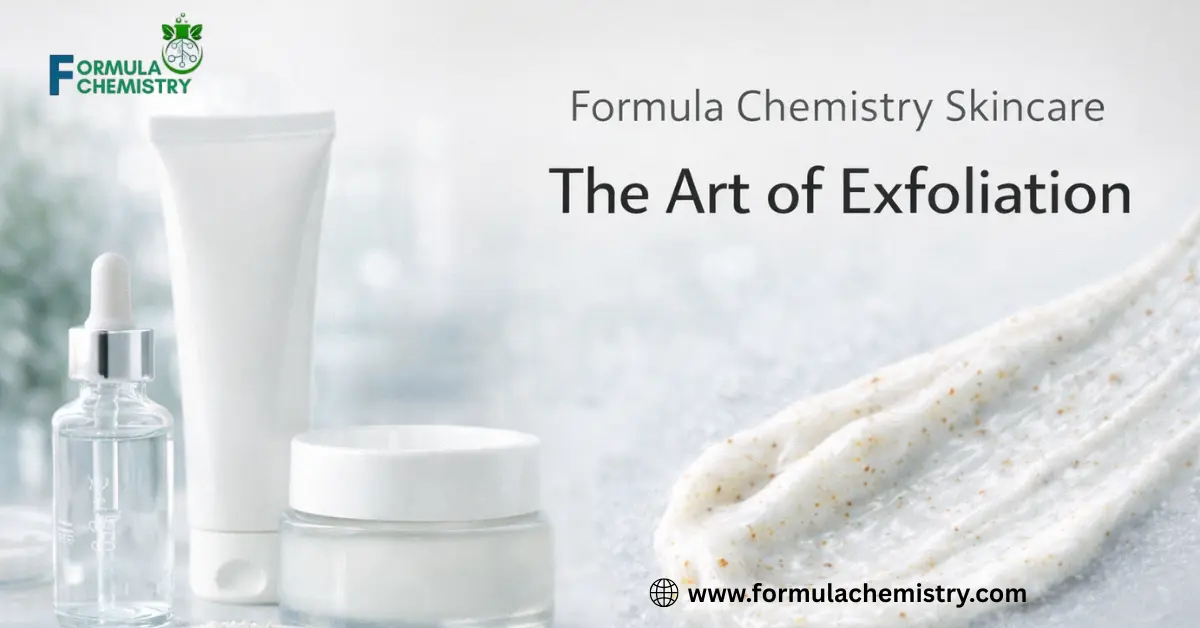Introduction
Acne free skin is not just a teenage phase; it is a complex inflammatory condition driven by the biology of your pores and the bacteria that reside within them. Treating it requires more than hope; it requires a strict adherence to scientific principles.
By understanding your skin’s chemistry and the products you use, you can interrupt the cycle of breakouts.
To translate this science into your daily routine, start by learning the foundational habits that protect both your pores and skin barrier.

What Causes Acne at a Molecular Level?
Before you can treat acne, you must understand the biological cascade that triggers pimple formation inside the follicle.
The Role of Hyperkeratinization
Acne begins when dead skin cells do not shed properly. Instead, they stick together, trapping sebum inside the pore.
This sticky mixture creates a plug. In formula chemistry, we look for ingredients that break the ionic bonds between these cells to prevent the clog from forming in the first place.
Bacterial Proliferation
Cutibacterium acnes (C. acnes) is a bacterium that thrives in oxygen-free environments, like a clogged pore.
It feeds on sebum and produces fatty acids that irritate the pore lining. This triggers an immune response, leading to the red, inflamed papules we recognize as acne.
The Chemistry Formula of Effective Cleansing
Cleansing is the foundation of acne prevention, but it must be precise to avoid stripping the acid mantle, which protects against bacteria.
pH Balance is Critical
Acne bacteria thrive in an alkaline environment.
You must use a cleanser with a chemical formula balanced between pH 4.5 and 5.5. This acidity inhibits bacterial growth while preserving the skin’s natural lipids.
Surfactant Selection
Avoid high-foaming sulfates like SLS, as they may strip the skin, potentially increasing oil production in response.
Opt for gentle surfactants, such as Salicylic Acid-based cleansers. These penetrate the lipid plug to clean deep inside the pore without causing surface irritation.

Formula Chemistry Skincare: The Art of Exfoliation
Exfoliation removes the “lid” from the pore, allowing oil to flow freely, but overdoing it destroys the barrier.
Beta Hydroxy Acids (BHA)
Salicylic Acid is unique because it is lipophilic (oil-loving).
Its chemical formula allows it to dissolve through sebum to reach the bottom of the pore. It acts as a pipe cleaner, removing debris that clogs pores and causes blackheads and whiteheads.
Alpha Hydroxy Acids (AHA)
Ingredients like Glycolic or Lactic Acid work on the surface.
They dissolve the glue holding dead cells together. This reduces the surface buildup that traps bacteria, ensuring a smoother texture and faster healing of post-acne marks.
Hydration: The Misunderstood Step
Some people with acne may skip moisturizer, believing it clogs pores. However, dehydration can worsen acne by compromising the pore lining.
Water vs. Oil
Acne-prone skin needs water (hydration), not necessarily oil (moisture).
Use humectants like Hyaluronic Acid or Glycerin. These ingredients attract water to the skin, keeping the cells plump and the pore openings flexible and clear.
Non-Comedogenic Formulation
In Formula Chemistry skincare, we look for “non-comedogenic” ingredients that are proven not to block follicles.
Look for gel-based moisturizers containing Niacinamide. This ingredient hydrates while simultaneously regulating oil production and reducing redness.
Targeting Bacteria with Active Ingredients
To stop acne, you must reduce the bacterial load on the skin using proven antimicrobial agents.
Benzoyl Peroxide Mechanics
Benzoyl Peroxide works by introducing oxygen into the pore.
Since C. acnes bacteria are anaerobic (cannot survive in the presence of oxygen), this effectively kills them. It is a powerful oxidizer, so start with a low percentage (2.5%) to avoid damaging the barrier.
Retinoids for Turnover
Retinoids (Vitamin A derivatives) accelerate cell turnover.
They normalize the shedding of skin cells, preventing the initial plug. Consistent use changes the chemical formula of the skin’s behavior, making it less prone to congestion over time.
Formula Chemistry DIY: Safe Spot Treatments
When a pimple strikes, you can use Formula Chemistry DIY principles to create effective spot treatments without damaging your skin.
Tea Tree Oil Dilution
Tea Tree Oil is a natural antimicrobial comparable to Benzoyl Peroxide.
- For a spot treatment, dilute Tea Tree Oil: add 1 drop of Tea Tree Oil to 10 drops of Jojoba Oil in a small container. Mix thoroughly before application.
- Using a clean cotton swab, dab a small amount of the diluted mixture onto each active pimple. Do not apply over large areas. Use 1-2 times daily as needed.
- Jojoba mimics sebum, carrying the antibacterial oil deep into the pore.
Clay and Sulfur Masks
Sulfur is a keratolytic agent that dries out the surface of a pimple.
To create a clay and sulfur mask: blend a small amount of Sulfur powder with an equal amount of Bentonite Clay. Add enough water to form a thick, spreadable paste. Apply directly to breakout areas, leave on for 10–15 minutes, then rinse off completely with lukewarm water.
Diet and Internal Biochemistry
Your gut health directly influences the inflammation levels in your skin; topical treatments can only do so much.
The Sugar Connection
High glycemic foods (sugar, white bread) spike insulin levels.
Insulin stimulates androgen hormones, which in turn increase sebum production. Reducing sugar intake lowers this hormonal trigger, starving the acne bacteria of their food source.
Dairy and Inflammation
Dairy milk contains hormones meant to grow a calf.
In humans, these precursors can mimic testosterone, leading to hormonal acne around the jawline. Switching to plant-based milks often reduces deep, cystic breakouts.
Sun Protection for Acneic Skin
UV rays cause inflammation and oxidize squalane in your sebum, turning it into a comedogenic wax that clogs pores.
Chemical vs. Mineral
Mineral sunscreens (Zinc Oxide) are often better for acne.
Zinc is naturally anti-inflammatory and soothing. Ensure the formula’s chemistry is micronized and lightweight to prevent heat and sweat from trapping against the skin.
Preventing Dark Spots
Acne leaves behind Post-Inflammatory Hyperpigmentation (PIH).
Sun exposure darkens these marks permanently. Daily SPF is the only way to ensure your acne scars fade quickly and evenly.
Hygiene Habits and Environmental Factors
Your environment is full of bacteria that can transfer to your face and undermine your skincare efforts.
Pillowcase Hygiene
You spend 8 hours a night with your face pressed against a pillow.
Oils and bacteria accumulate rapidly. Switch to a silk pillowcase (less friction) and wash it every 2-3 days to prevent re-infecting your pores.
Phone Screens
Your phone screen is often dirtier than a toilet seat.
Pressing it against your cheek transfers bacteria directly to the pores. Clean your phone daily with alcohol or use headphones to keep the screen off your face.
Stress Management and Hormones
Stress releases cortisol, a hormone that sends your sebaceous glands into overdrive.
The Cortisol Spike
When you are stressed, your body prepares for “fight or flight” by producing more oil.
Thicker sebum produced during stress is more difficult to remove from pores. Managing stress through meditation or good sleep supports balanced cortisol and healthier skin.
Sleep and Repair
Skin repairs itself while you sleep.
Lack of sleep increases systemic inflammation. Aim for 7-9 hours to allow your immune system to effectively fight off the acne bacteria.
Conclusion
Clearing acne is not about aggressiveness; it is about using a science-based approach to restore balance.
By maintaining pH balance, regulating oil production, and using targeted chemical formula treatments, you can achieve lasting clarity.
Whether you rely on clinical serums or DIY remedies from Formula Chemistry, consistency and gentleness are your most powerful tools for acne-free skin.
FAQ’s about Daily Skincare Habits for Acne Free Skin
How long does it take to see results from an acne routine?
Skin cells take approximately 28 days to turn over. Therefore, most acne treatments, including retinoids and acids, require at least 4 to 6 weeks of consistent use before you see a significant reduction in breakouts and texture.
Is Benzoyl Peroxide better than Salicylic Acid?
It depends on the acne type. Benzoyl Peroxide is better for killing bacteria in red, inflamed pimples (pustules). Salicylic Acid is superior for dissolving oil and treating non-inflamed blackheads and whiteheads by exfoliating inside the pore.
Can I use Vitamin C if I have active acne?
Yes, Vitamin C is an excellent anti-inflammatory that can help reduce the redness of active acne. Additionally, it inhibits melanin production, helping prevent dark spots (hyperpigmentation) that often remain after a pimple heals.
Does makeup cause acne?
Not all makeup causes acne, but “comedogenic” products do. You must look for labels that say “non-comedogenic” or “oil-free.” Additionally, failing to remove makeup completely with a double cleanse at night will definitely clog pores.
Why is my acne getting worse after starting a new product?
This is likely “purging.” Active ingredients like retinoids and acids speed up cell turnover, bringing deep micro-comedones to the surface all at once. Purging typically lasts 2-4 weeks and indicates that the chemical formula is working.
Can diet alone cure acne?
For some people, diet plays a massive role, while for others, it is genetic. However, reducing sugar and dairy is scientifically proven to lower inflammation and oil production, which significantly supports any topical Formula Chemistry skincare routine.
Should I pop my pimples?
No. Popping forces bacteria and pus deeper into the dermis, rupturing the follicle wall. This increases inflammation, spreads the infection to surrounding pores, and significantly increases the risk of permanent scarring.
Is natural skincare better for acne?
Not necessarily. Many natural ingredients, like Coconut Oil, are highly comedogenic (pore-clogging). Conversely, synthetic ingredients like Salicylic Acid are chemically formulated to safely clear pores. Understanding formula chemistry is more important than the source of the ingredient.

